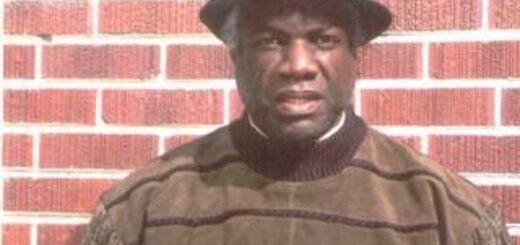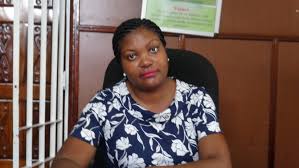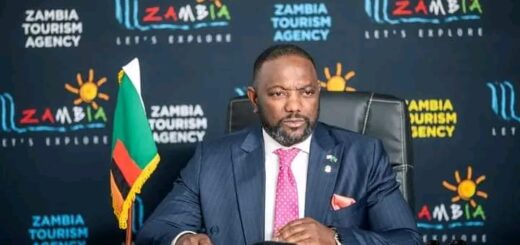Zambia’s weak political foundation, worries Fresher Siwale
Notice: Undefined index: catFilterList in /home/zambi/public_html/wp-content/plugins/wp-likes/api.php on line 243
By Derrick Sinjela
ZAMBIA’S Sixth Republican President Edgar Chagwa Lungu is politically welcome to arrest us so that we end the teething issues surrounding his identity fraud, says New Labour Party (NLP) leader, Fresher Siwale.
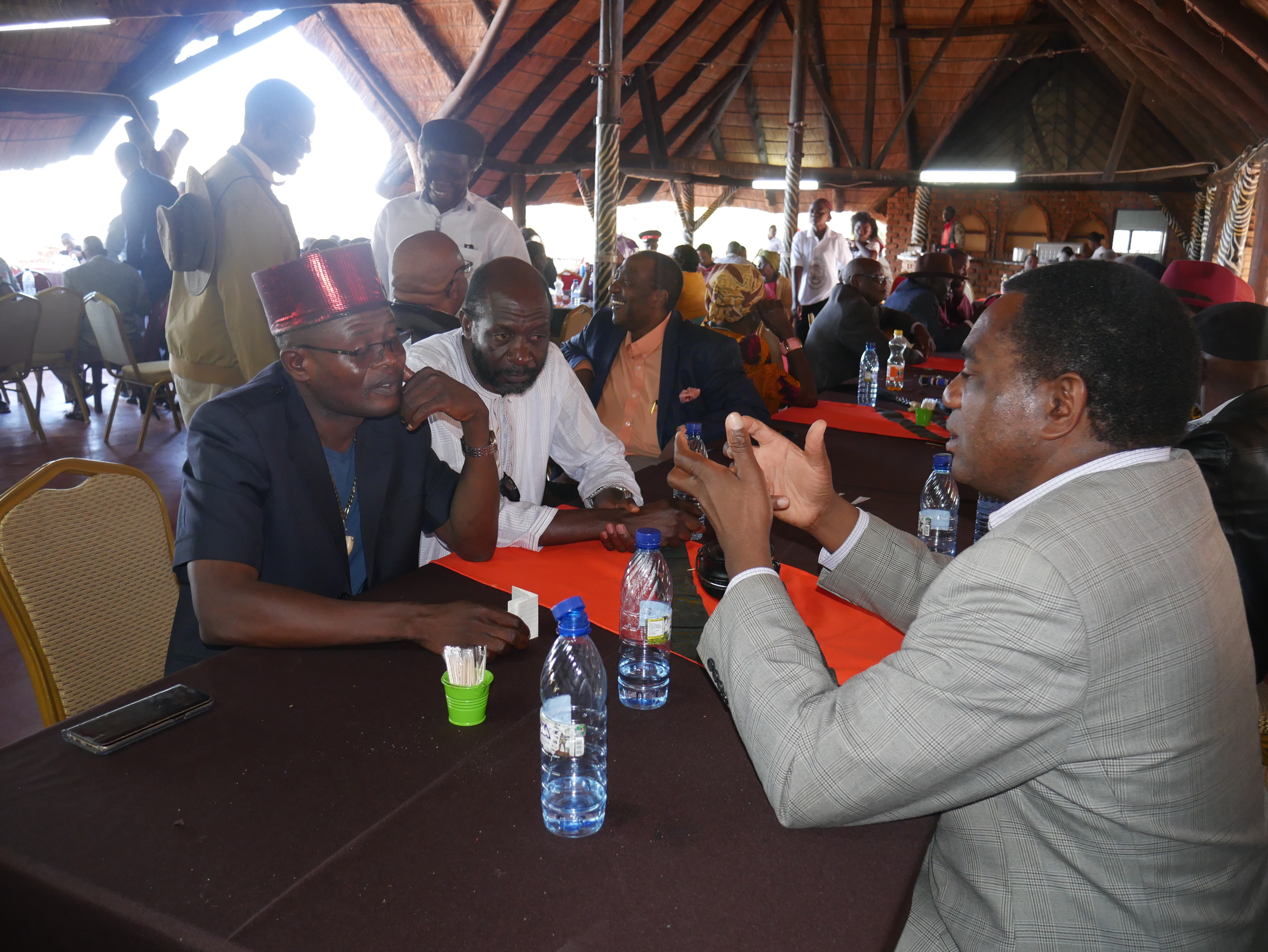
Chief Mukuni Ceremony Livingstone pix 2018 by Derrick Sinjela (880)
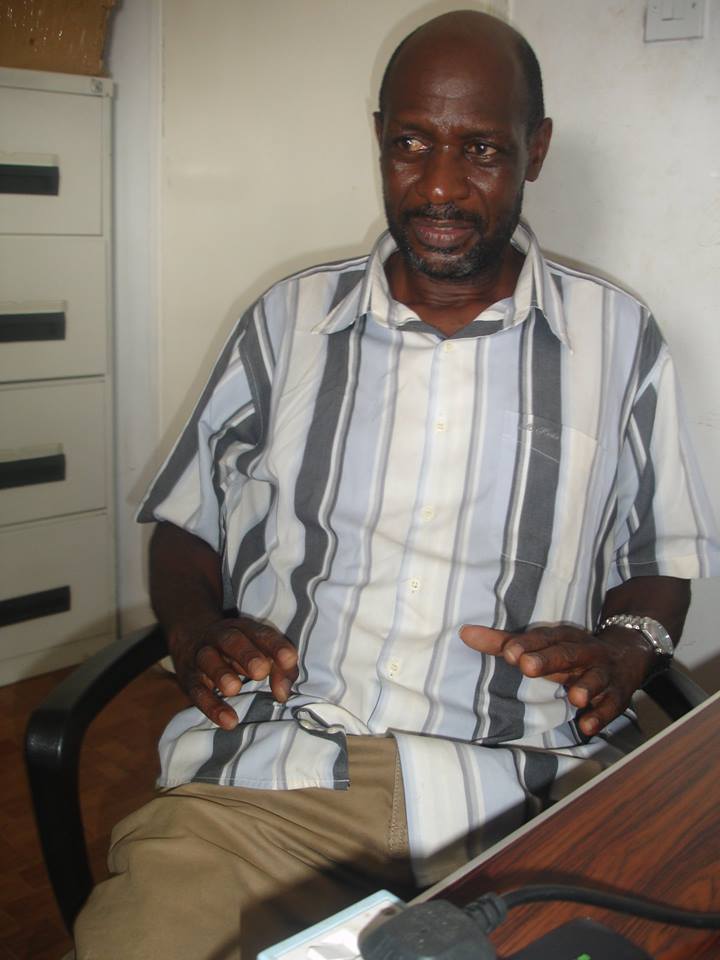
New Labour Party (NLP) President Fresher Siwale pix by Derick Sinjela 2018
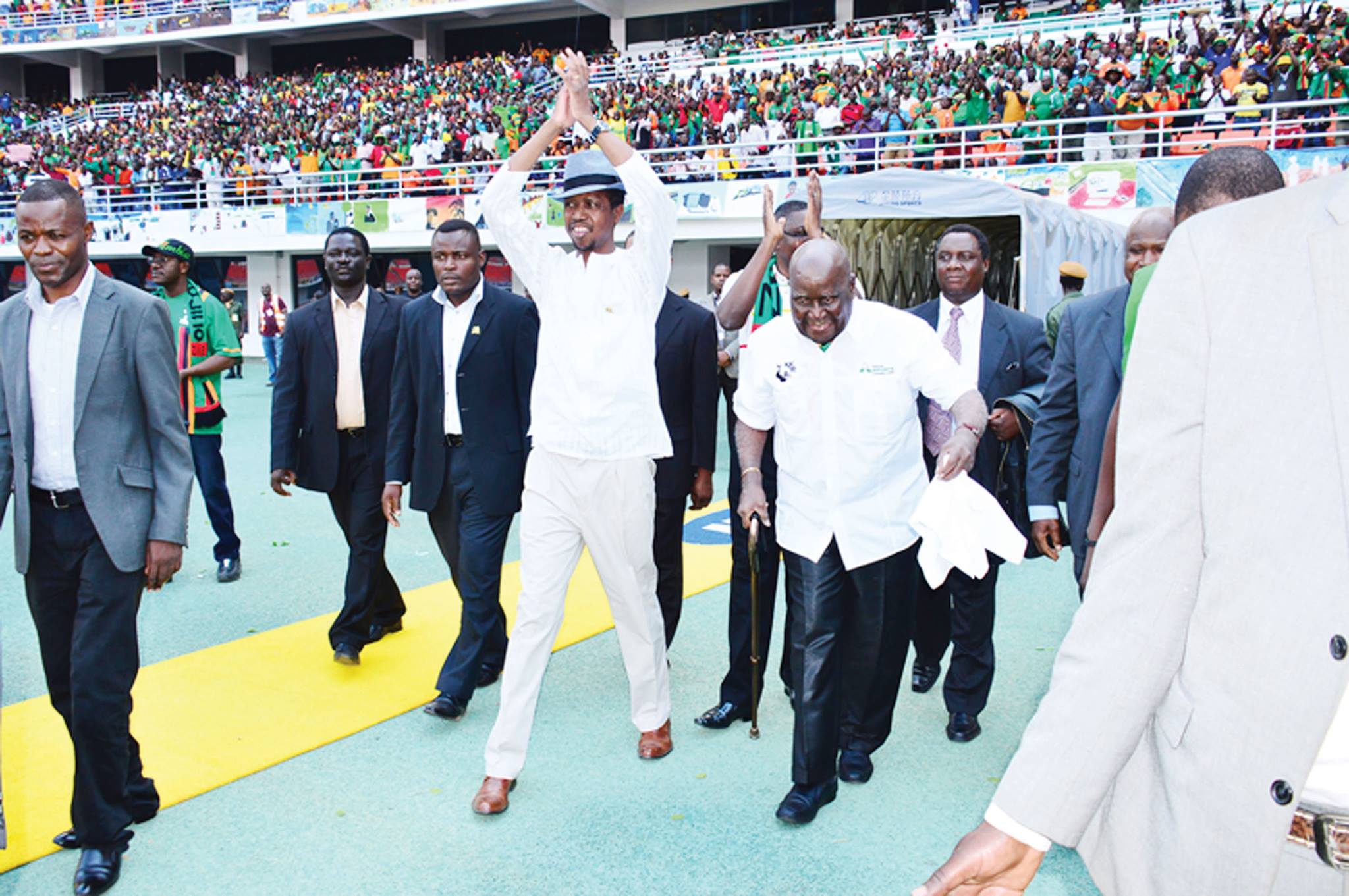
ACTING President Edgar Lungu and former President Kenneth Kaunda
Responding to online speculations that President Lungu was unsettled following a series of stories , quoting Peoples Party leader and himself, insinuating that that the Zambian leader has’ Malawian Blood’ or was born in Malawi, Siwale said a day in court to amplify facts is a welcome culmination.
Siwale stated that it is worrying for the Zambian President to keep silent on a matter of national concern, pointing out that ‘Identity Fraud’ issues need to be quickly resolved, so as to bring an end to speculations.
“We would all like now to end this speculation, that is why we are looking ahead to go to court,” taunted Siwale.
On birthing a comparably acceptable Zambian dress code, Siwale holds a view that dressing or one choice of a dress code is a relative term., as what may be viewed as poorly dressed attire may be turn out to be good to others.
A tart Siwale stated that destitution and economic reasons are contributing factors compelling Zambians to adopt relatively poor dress codes and to greater length covering them with material meant for dinner and night life during daylight.
“We must begin to asked ourselves is what has led to our people to be assumed as being poorly dressed? Our boys and girls opt to dress in attires meant for night activities within the Central Business District (CBD), perhaps out of ignorance poverty, or sheer desire to reap some income from gullible ‘Sweet Mamas and Daddies.
The New Labour party leader lamented in a Good Friday interview in Lusaka that ‘Indigenous Citizen’s Right’ to prosperity and wealth has been destroyed by what he termed lackadaisical leadership witnessed in the last 54-years since Zambia attained independence from Great Britain.
“Our people’s wealth has been destroyed and people are currently wallowing in poverty and squalor. This has led to people to dress anything they can lay their hands on. The Other group is now opting to dress intentionally; seductively dressed to appeal to prospective females and males. ‘Amakwebo ayashimokeka tabishita’ , said Siwale literally translated as ‘Customers will not buy what has not been advertised’.
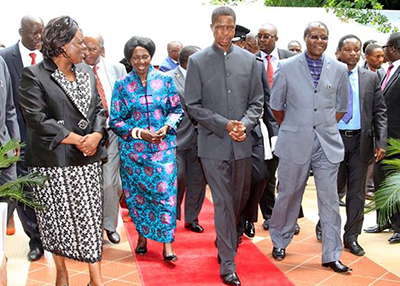
INONGE-WINA-PRESIDENT-LUNGU-STATE-HOUSE2
Insisted Siwale: “It depends on what angle one looks at the matter at hand otherwise, the majority do not have a choice a particular dress code is dictated a mission at hand or for a majority by poverty levels.
Siwale associates Zambia’s poor leadership as a reason for the countries majority population leaving in abject poverty.
“The top most political hierarchy in Zambia does not motivate citizens. Just as a human body or foot is controlled by the head, and depends largely on the brain. Even in the nation, the working culture and livelihood of the people is determined by priorities set by political leaders. Despite citizens have a lot of problems; the Government is increasing the number of holidays. We just had Women’s Day, Youth Day, the Presidents additional holiday and now have to cope with a five-day Easter Holiday”, laments Siwale.
“Holidays are now being granted left right and center. If ninety (90%) per cent of the Zambians are unemployed. Why declare new holidays? It is really heartbreaking that most of the time people in our country are moving aimlessly in town. This is taking away from the little national productive capacity that is available. It all depends on the vision of the leaders. Most come into office by accident. No vision to handle the ‘’Herculean Office of State. To them it is an ordinary job; and all they do is partying, dancing and merrymaking.
Perhaps paraphrasing Party of National Unity (PNU) President, Highvie Hamududu’s tagging of poverty, high income inequality and high unemployment, Siwale is extremely aggrieved that regardless of citizens being out of jobs.
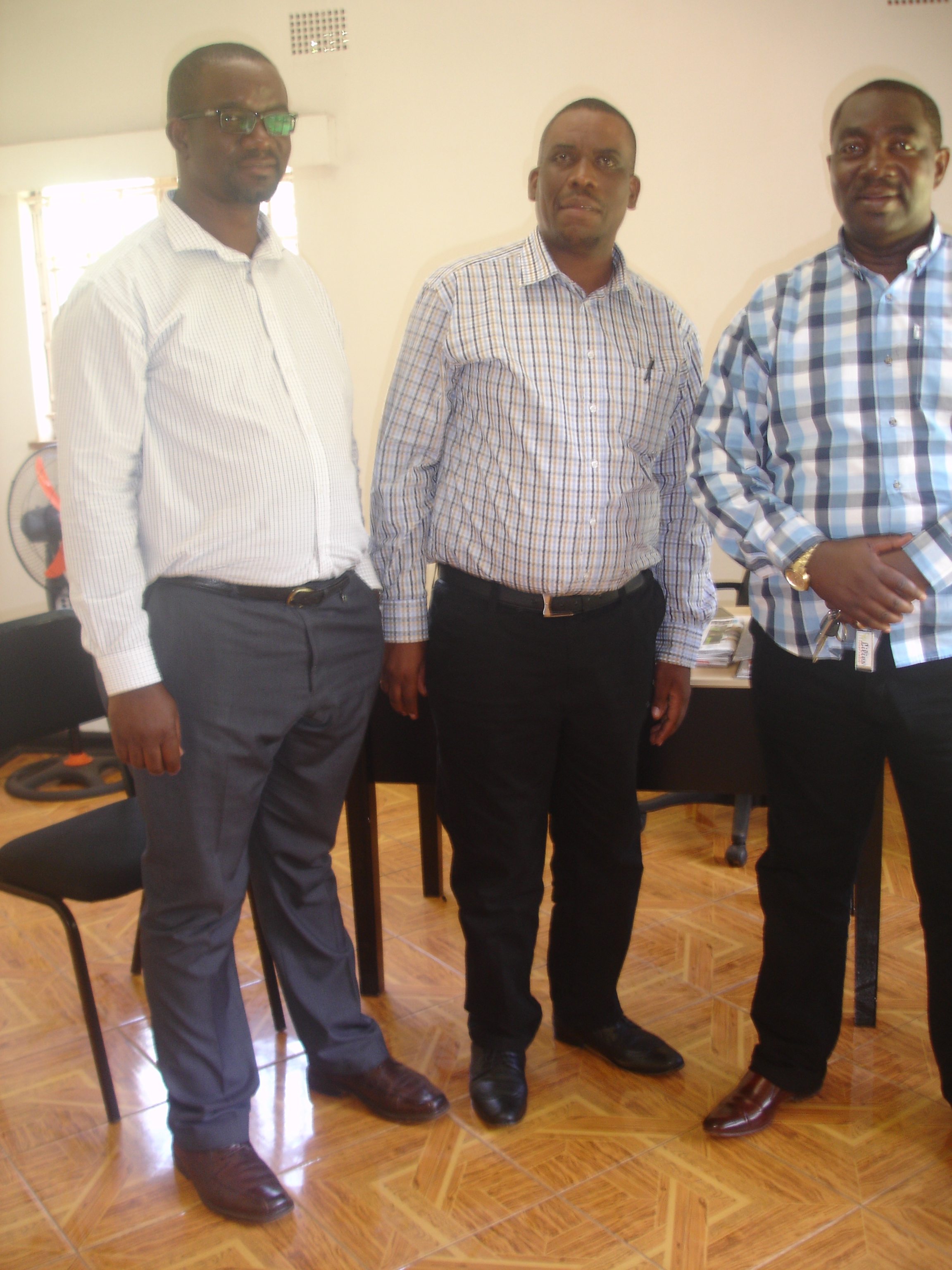
Party of National Unity President Highvie Hamududu, Vice President Anthony Makuwa Lusaka and Secretary General Kasote Singogo 2017 Dec pix by ZADEMA
Picking a fight with successive Governments, Siwale doubted the Patriotic Front (PF) capacity to emancipate the Zambian people.
“These politicians in Government have no ideas of how to develop Zambia or empower its citizens. The legacy is a foundation, so if they do not know the foundation or functional ideas, how do they lay a firm development foundation for the next generation. When leaders are woken in the night, you end with problems,” said Siwale.
Looking back, Siwale an educationalist or school teacher by profession recollected that at independence on Saturday 24th October 1964, the population of Zambia was three million people, with number of pensionable or formal jobs rated at K500, 000.
Today, with the population moving toward the 20 million mark, Siwale laments that formal jobs are still static at the 1964 figure of 500, 000, compelling a deafening : ‘what has happened really, owing to statics that placed the convertible local currency the kwacha at par with the British Pound and one better than the United States
“At independence, the exchange rate was one kwacha (K1) to one pound (UK£1) or two dollars ($2 to one kwacha (K1). Today it is over K14 or K14, 000 (un rebased). This simply means that the Zambian wealth has been devalued 14, 000 times. The value of the wealth in Zambiais less than that amount. Our leaders do not even know that they are destroying the country’s income.
Siwale is incensed that while the British and United States of America Governments fight to protect citizens, African leaders fall on each other’s shoes to take away the individual and collective prosperity of its people.
Explaining Zambian woes
Siwale assessed that the problem of Zambia is two-fold; the first being British influence with the caliber and quality of leadership elected since 1964 as a second reason.
The British problem
During Lancaster House negotiations, Siwale recollected that the British colonial Government put a caveat, which clearly stated that the instigators could only trust Kenneth Kaunda and feared Simon Mwansa Kapwepwe or Harry ‘Old Lion’ Mwaanga being bequeathed with political power.
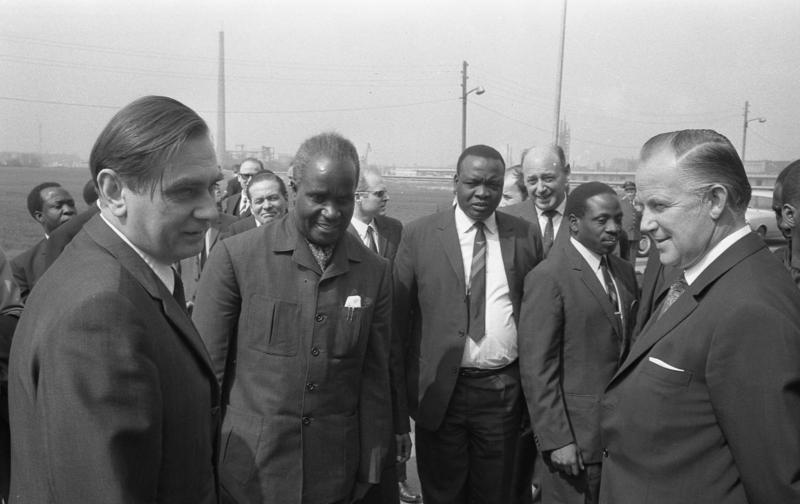
Staatsbesuch Sambia, Präsident Kenneth D. Kaunda
Farbwerke Hoechst
The New Labour Party leader says Northern Rhodesia freedom fighters were coerced into dancing for KK on account that any talk of Kapwepwe or Nkumbula being drafted or proposed as a preferred candidate to lead the ‘New Zambia’ would collapse the Lancaster Talks.
“I believe the insistence by Britain to insist on KK being ‘Constitutionally’ entrenched or elected as Zambia’s founding President is responsible for the leadership quagmire experienced in our country since attainment of independence on Saturday, 24th October 1964. British colonial masters did not let Zambians choose a leader do but imposed KK on us,” Siwale grieved.
Secondly, Siwale links Zambia’s poor leadership heritage to a fact that most if not all the six leaders chosen in the last 54 years have a ‘village’ characteristic.
“Now, the other problem is that, you will understand that the founding fathers of Zambia all came from the village and the settlements had no ‘civilized’ governance. Social service delivery did not exist in the villages where our leaders hail from. The British handed over Zambia to a group of citizens who did not understand social service provision,” complained Siwale.
Siwale says the idea of social service provision being an aspect of economic development has never existed.
The Zambian politician says to date, both President Lungu and opposition leaders, do not understand the importance of social service delivery, evident in dysfunctional local government administrations countrywide.
Talking urban renewal, Siwale equally cast doubt on the capacity of United Party for National Development (UPND) leader Hakainde Hichilema, on record to have confessed being born and bred in a village.
“Even when you look at those vying for office in the opposition, you find that they all grew up in the village. Most of our leaders are where they are by accident as sanitation or answering the call of nature is done by hiding in a shrub. When one wants to fetch water, it is really to run to a nearby river. To move at night, one has wait for moonlight. So, when you give them ‘villagers’ governance power; what experience are they bringing into Government? They simply will see this collapsed system as an improvement in comparison to their village. Let us reorient them to attain leadership skills. Let us evaluate leadership, to avoid a situation of repeating mistakes,” Siwale paraphrased Ebert Einstein, popular thought which reads:-A person who never made a mistake, never tried anything new. “.
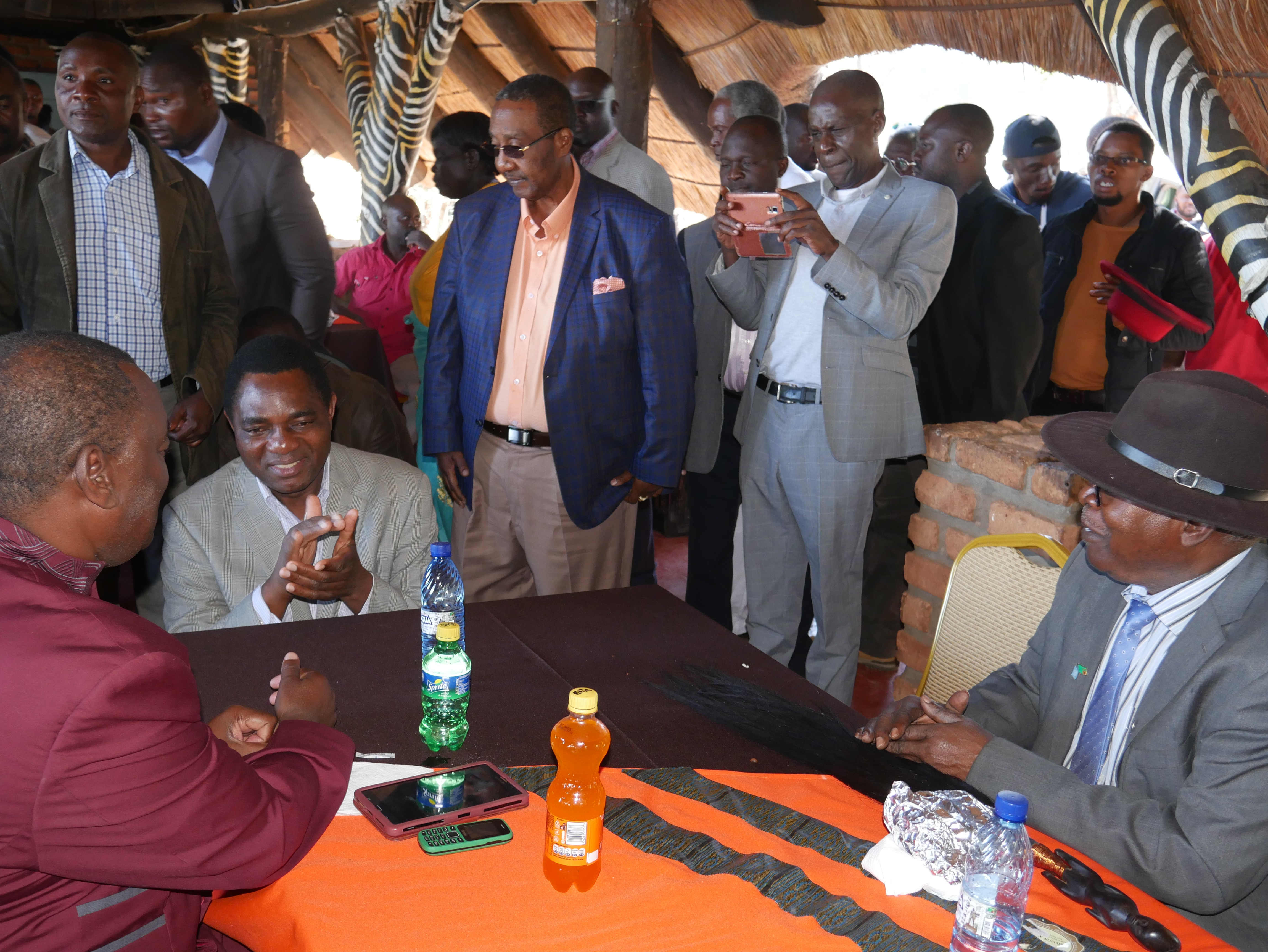
UPND leader Hakainde Hichilema and Vice President Dr. Geoffrey Bwalya Mwamba at Chief Mukuni Ceremony Livingstone pix 2018 by Derrick Sinjela
Examining KK administration
Siwale is filled with a hurting heart that though Dr. Kaunda and UNIP peers inherited a sound treasury known as reserves, the new crop of leaders made a wrong development path as they chose to utilize the bequeathed resources.
Siwale is aggrieved that instead of keeping the reserves sound, the UNIP leadership miscalculated by spending the said savings.
“We inherited a hefty treasury called reserves. The UNIP leadership did not understand that reserves are savings for the nation so that the unborn Zambian child can find a healthy reserve. The Kaunda leadership spent as though tomorrow would never come,” said Siwale.
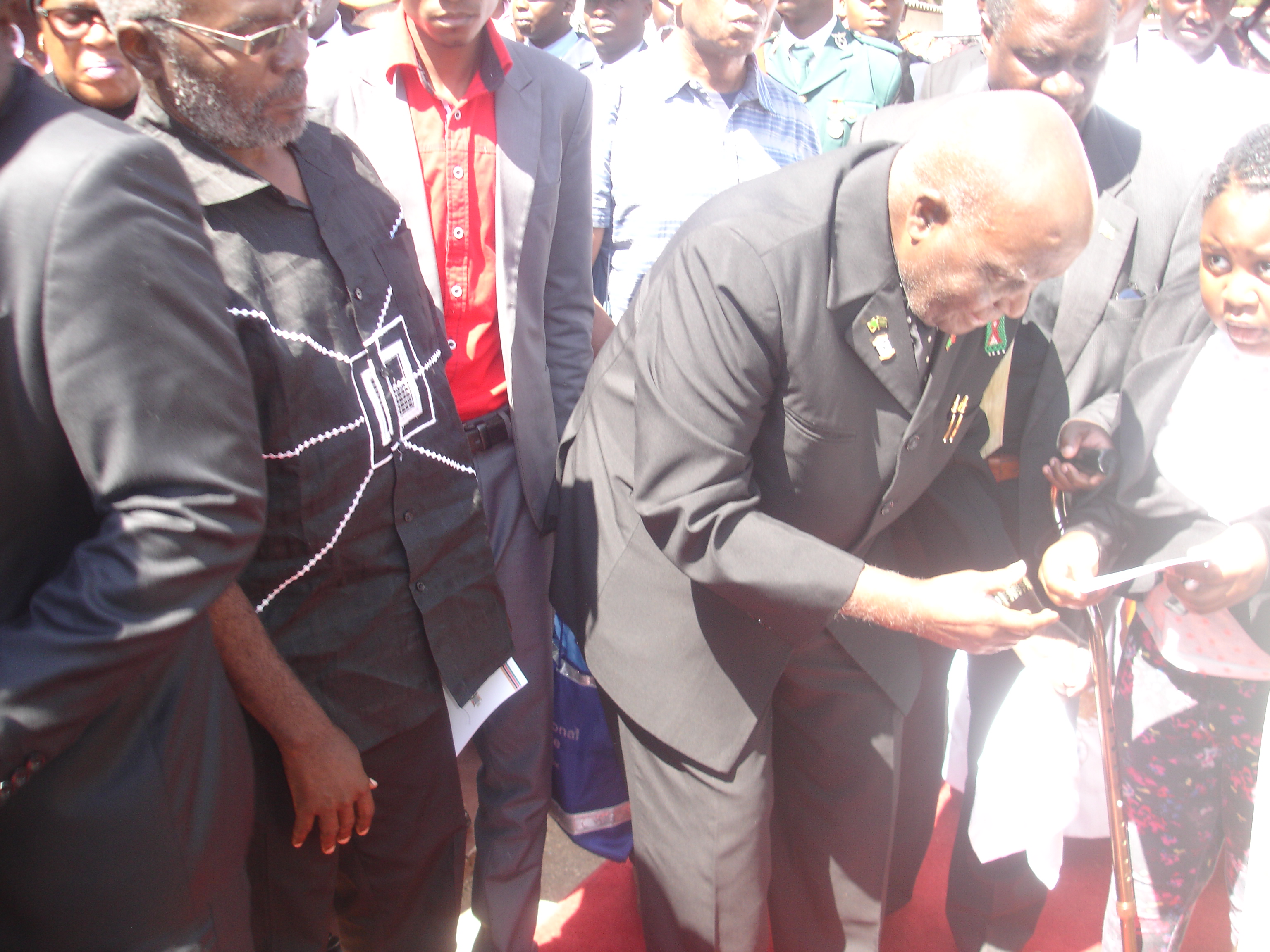
Zambia’s former First Republican President Dr. Kenneth David Kaunda with UNIP President Tilyenji Chanda Kaunda – Picture by Derrick Sinjela
Siwale reiterated that KK and UNIP were not prepared for leadership, on account of the wrong industrial growth model chosen.
“The leaders chose to acquire plant and machinery with no regard to the demands of the market, in contrast of the much viable industrial growth,” said Siwale.
Thirdly, recollected that the UNIP leadership under ‘Shkulu Kaunda’ did not fully assimilate the real reason which prompted the ‘British White Colonial Masters’ or Federal Government to establish the Industrial Development Corporation (INDECO).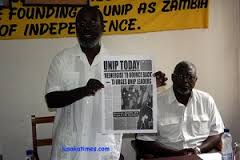
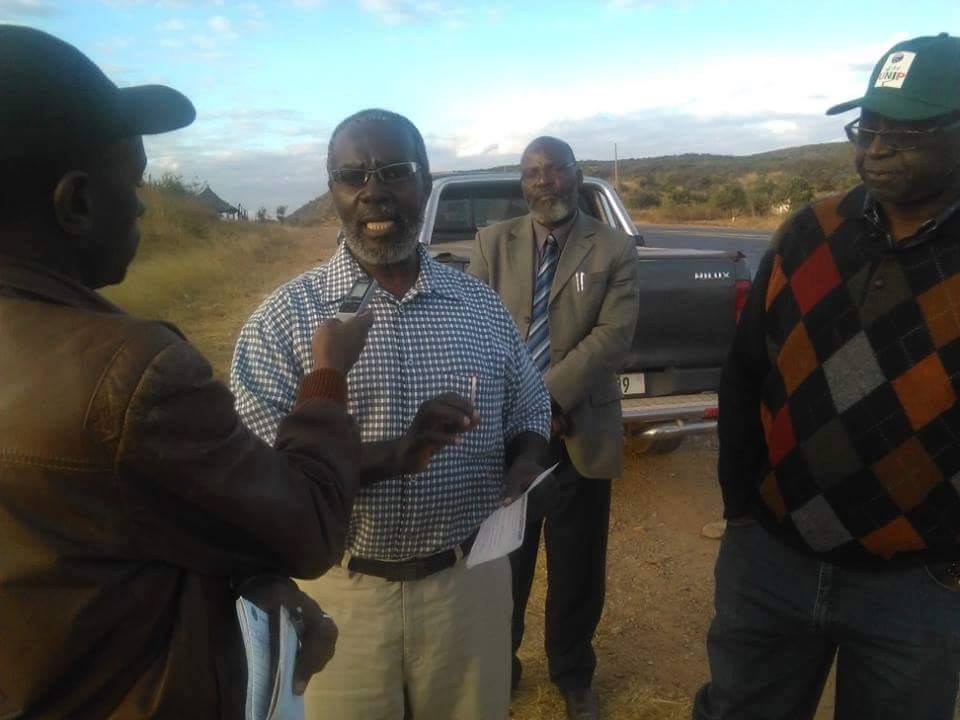
UNIP Presidential candidate Mr Tilyenji C. Kaunda being interviewed by Evans Sinjela from 5fm in Kafue District
After taking office, the UNIP leadership drafted an INDECO Act, which contradicted the initial INDECO nemesis, which has been construed as an empowerment means of indigenous British citizens, ultimately precluding citizens from accumulating wealth.
Siwale says INDECO was formed in 1960 by the Federal Government, essentially as a tool for facilitating technological transfer to citizens in Southern Rhodesia.
“The British Colonial Government set up INDECO in 1960 as a vehicle to finance technological advancement projects for ‘White’ Rhodesians specifically those in Southern. But at independence, without understanding objectives just removed British with Andrew Sardanis in 1965. KK and UNIP proceeded to transform INDECO through an Act of Parliament, and introduced a clause that if K500, 000 or 500, 000 pounds, Government would take 51 per cent without compensation,” a tense Siwale, nephew to Donald Siwale, who founded Mwenzo Mission.
Siwale says the measure acted as a deterrent for Zambians to accumulate wealth and now indigenous citizens are more inclined toward being workers and not wealth creators, thus thwarting a surge in entrepreneurship.
“Subsequently, the entrepreneurial spirit which could have resulted is dead, to the extent that today, with just two taxis and a lodge, one is viewed as being wealthy,” teased Siwale
Said Siwale: “But look at Zimbabwean Strive Masiwa, is an influential but here Airtel is owned by foreigners. INSCO is owned by Simba Makoni, controlling entrepreneurial traffic from Cape to Cairo through the Nandos fast food brand. So, in my view, former Zimbabwean President, Robert Gabriel Mugabe was better as he created an environment in which Dellma Lupepe could offer government to build fibre network. The Mazhandu Bus Services and many others that flood the Zambian transport sector are counted as small entrepreneurs. In a nutshell, infrastructure in the Central Business District of Harare is owned by indigenous Zimbabweans,” observed Siwale.
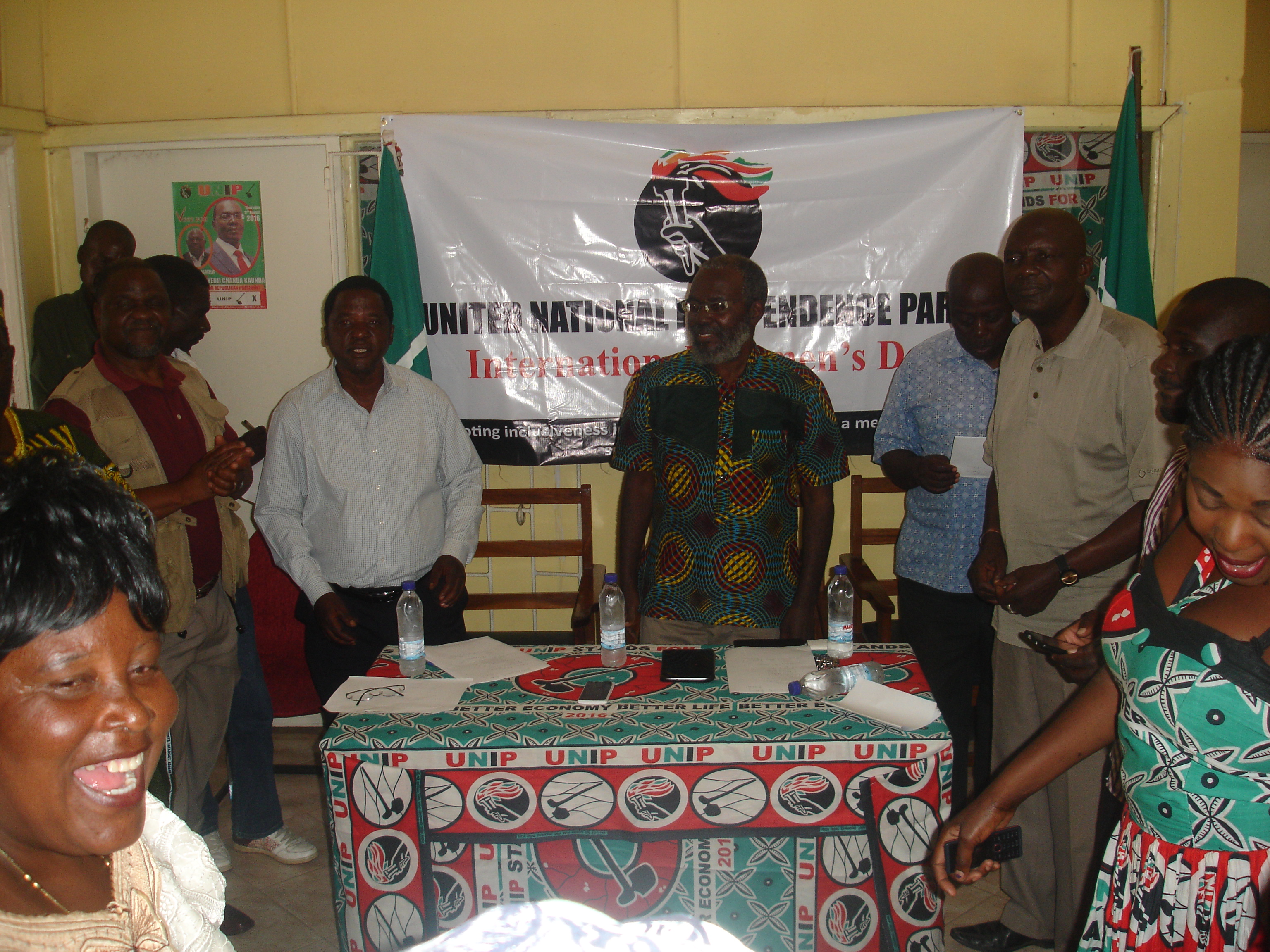
UNITED National Independence Party (UNIP) President Tilyenji Kaunda
Siwale says when citizens participate in an economy; they are bound to retain created wealth within a particular country.
“The mistake of independence is that we did not protect our people. The ignorant Zambian politician and British to blame,” said Siwale, as a passed a vote of no confidence in technocrats, groomed at the University of Zambia (UNZA) Great East Road Campus.
“It is really regrettable that Zambian technocrats have no say in charting Zambia’s development destiny. Secondly, the problem is that technocrats in Zambia came through UNZA, and we relaxed that they are educated!! And others given an opportunity to evaluate companies for sale claim to be economic managers, when valued and sold’ Premium Oils’ and ‘Mansa Batteries’ at one us dollar; pricing a chicken at five dollars. But we cannot blame them; this was the value at village level. We have a lot of inherent problems. And do not seem to find time to stop and reflect on our mistakes over the years. If we reviewed the policy or defective policy decision could make a clean start for Zambia,” said Siwale.
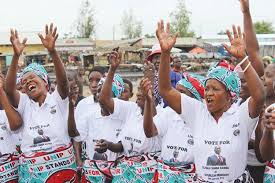
UNIP members
Making reference to the United Nations Conference on Trade and Development (UNCTAD), established in 1964, to promote a development-friendly integration of developing countries into the world economy, Siwale said the first mistake was failure to separate reserves from balance of payments.
Secondly, as stated earlier, Zambia adopted the industrial model, and thirdly, the new leadership ignored resolutions of the 1966 UNCTAD conference, fourth the nationalization of private assets, fifth the 1972 mortgage crisis, the declaration of the one party state, the 1980 decentralization policy, the auctioning of the kwacha, without understanding its implications on the local economy.
“Then, the structural adjustment programme and the Patriotic Front (PF) disaster; where collected the ignoramus of this nation and handed them Government. They are no messiahs in this world even I am m not one. The only messiah is the Lord Jesus Christ And because of the way the British our democracy has not grown,” a tart Siwale flashed a ‘Red Card’ on successive Zambian Governments.
Siwale laments that ever since the British interference, Zambians have not been allowed a choice of leaders.
“At midnight on Friday 23rd October 1964, our Zambia turned out to be a title deed KK and all of us (citizens) became labourers on Dr. Kenneth David Buchizya Kaunda’s farm. It is that spirit of slavery that exists. Whoever comes as a Republican President feel they own the land. Only one citizen, President, is important, the rest of the citizens have rights literally suspended. You cannot take Government to court for failure to provide food jobs shelter since independence,” said Zambia.

Basic Needs Basket costs for May 2018 rise
“Democracy must come with rights to life, health, education, shelter and right to wealth which are suspended. This country was given to one citizen KK, granted control by the British Government from Cecil John Rhodes. We have a myriad of problems that we need to resolve. In resolving these socio-economic challenges, we shall then revive the national spirit which is now dead. As long as it is dead, If nothing is done, our misery shall persist,” advised Siwale.
The New Labour Party leader says Zambia is in dire need of a new crop of leadership.
“We need a right mix of leadership, those that understand Zambia from yesterday and today to give direction as to where we are going as a country. Look at the violence in Zambia’s politics, it gets back to 1960s, when UNIP would unleash violence and blame it ANC as perpetrators of violence.
Recalling or walking down memory lane, Siwale recollected an incident at Lusaka’s Lumburma market, since renamed as Kamwala Shopping Centre, during which UNIP cadres led by Harawa Saidi ‘savagely’ beat former Vice President, the late Simon Mwansa Kapwepwe, father to Chileshe Kapwepwe, formerly National Arts Council (NAC).
“Look at what happened when UNIP beat up Simon Mwansa Kapwepwe at Lumburma market, UNIP thugs led by Harawa Saidi, beat up Kapwepwe and the victim was banned. This violence of PF being witnessed today, started with UNIP. The violence and hatred in our politics is historical. That is the more reason, we now need to take a time of reflection as a nation. Come to grips with reality, and chart a new course of unity and love in the nation,” noted Siwale, whose grandfather recruited Reverend David Kaunda, KK’s father.
Perhaps, seeking a similar Truth and Reconciliation route adopted in Souuth Africa, after the demise of the Apartheid regime, Siwale called for conclusive dialogue, as ‘Frank Talk’ will heal the wounds afflicting the Zambian people.
“But unity and love will not come without reconciliation. We need the truth to reconcile. The truth shall set Zambians free as cannot reconcile on lies. We need to bring closure on this hatred,” said Siwale.
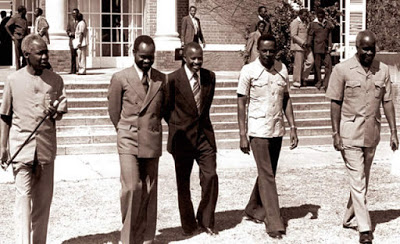
Front Line States, Tanzania’s Julius Nyerere (left), Mozambique’s Samora Moises Machel, Botswana’s Quett Masire, Angola’s Eduardo dos Santos and Zambia’s Kenneth Kaunda
In addition, Siwale is sad that despite helping liberate colonized Angola, Mozambique, Namibia, Zimbabwe and lately, South Africa, successive Governments in the emancipated countries have not paid ‘war’ assistance reparations.
“Zambia paid the budget of Botswana in 1966. Has Botswana appreciated or pad back. South Africa has paid reparations to citizens. But has South Africa paid reparations to Zambians who died for her liberation. Lives were lost. When you say KK was a good leader, to Zambia, what exactly do you mean? Our schools were filled with refugees, and just a negligible number of indigenous people attained university level education. Did KK get permission from parliament to spend the money? Basically Kenneth Kaunda destroyed the Zambianfuture,” says Siwale.
Anyhow, Siwale believes the International Monetary Fund (IMF) and the World bank have empirical evidence as to resources owed to Zambiain form of reparation.
“IMF and World Bank have details. The state of Angola, Mozambique, Namibia, Zimbabwe and South Africa. Zambians must now demand reparations for damages and destruction of lives to the people.
Advice to technocrats
Siwale says technocrats can only move with visionary leadership, thus cannot shoulder blame for Zambia’s socio-economic malaise. .
“They (technocrats) cannot start anything without the head heading in a particular or certain direction. These are the same skilled Zambian individuals like Professor Clive Chirwa, who perform abroad, Why do they fail here at home, unless somebody says the international community rigs that performance,” taunted Siwale.
Siwale, of the New Labour Party, which is proposing a four pillar – (1) Water and Sanitation, (2) National Food Security and Nutrition, (3) Qualitative Population Management and (4) Education as a basis of programs once in government, says the future for Zambia is bleak.
“There is no tomorrow for a poor Zambian. Look at the death rate, queues at the hospital, go to the grave yards, rallies throughout the week. In countries with bigger populations only bury at weekends,” Siwale said.
A look at Fresher Siwale’s New Labour Party (NLP)
By Derrick Sinjela
THE New Labour Party (NLP) believes in four (4) pillars namely (1) Water and Sanitation, (2) National Food Security and Nutrition, (3) Qualitative Population Management and (4) Education as a basis of programs in government.
Mr. Siwale, an educationist by profession says the first two pillars deal with national health management, national nutrition and generally creating confidence about tomorrow leading to industrialisation.
According to Siwale, the third pillar deals national demographics and demographic graduations for national planning and development and allocation of national resources.
The fourth and final pillar in New Labour Party programme of works is Education, globally viewed as an equalizer of empowerment and development.
“The reason we put education as fourth pillar is because the sector requires a return on investment and benefits from savings in the health sector. This return on investment can only be realised with increased life expectancy of the citizens via a quality of life sustained by good and healthy environment and higher standards of nutrition. Armed with information on national demographics and its graduations you can plan the education sector and allot it with enough resources to cover every citizen with full knowledge of increased life expectancy of Zambia,” prods Siwale.
Siwale holds a view that the Patriotic Front (PF) Government is failing to provide bursaries to students in colleges and universities because they are not equipped with the necessary information to manage not only the education sector but every aspect of Zambian development.
“The levels of ignorance among the PF leaders including President Edgar Lungu is appalling to say the least and it can be seen in the haphazard manner in which they deal with national issues. And this has led to the creation of corruption centers where ever a service must be delivered,” argued Siwale.
Siwale described a proposal by former First Republican President, Dr. Kenneth David Kaunda’ that bursaries be extended to private universities as a good suggestion if resources can allow.
“The current PF government is failing to cope with funding their own universities because of lack PF resources, how then can they extend the facility to the private sector? The answer lies in not despairing but to invest in ideas that will generate revenues for government to meet the national cost and you can only achieve your goals if you know what you want to achieve. And this can be realised if national planning was based on a system that took into consideration the necessary demographics and demographic graduations,” noted Siwale.
Siwale says the issue PF electing an indigenous ‘President’ is not a panacea, solution and answer to Zambia,’s underdevelopment but what Zambia needs is a cadre of knowledgeable citizens to prosecute the development agenda.
“It is not an individual like PF Roan Member of Parliament (MP) Chishimba Kambwili or Finance Minister Felix Chipota Mutati but a combined effort of citizens who believe in the recreation of the national spirit necessary to marshal national development. Great men will always be there but what is lacking in Zambia are great ideas,” protested a tart Swale.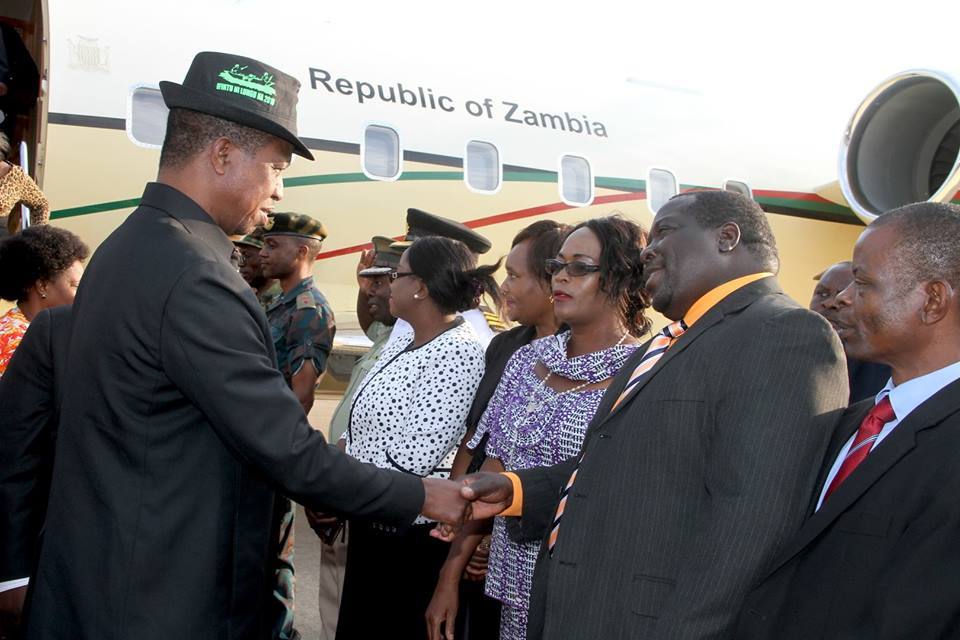
Why no mention of this conference?
By Alvin Booth (Monday November 27, 2016)
THE 1966 Solidarity Conference of the Peoples of Africa, Asia and Latin America, or Tricontinental Conference as it is better known, remains one of the largest gatherings of anti-imperialists in the world. More than 500 representatives from the national liberation movements, guerrillas and independent governments of some 82 countries gathered in Havana, Cuba to discuss the burning strategic questions confronting the anti-imperialist movement of the day. Amongst the delegates were some of the most important figures in the anti-imperialist movement including Fidel Castro, Salvador Allende and Amílcar Cabral.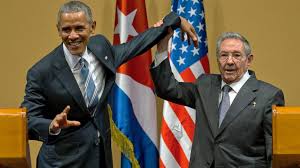
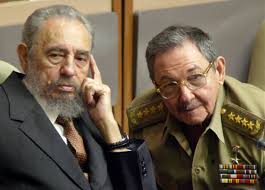
Cuban-President-Fidel-Castro-left-and-his-brother-Minister-of-Defense-Raul-Castro
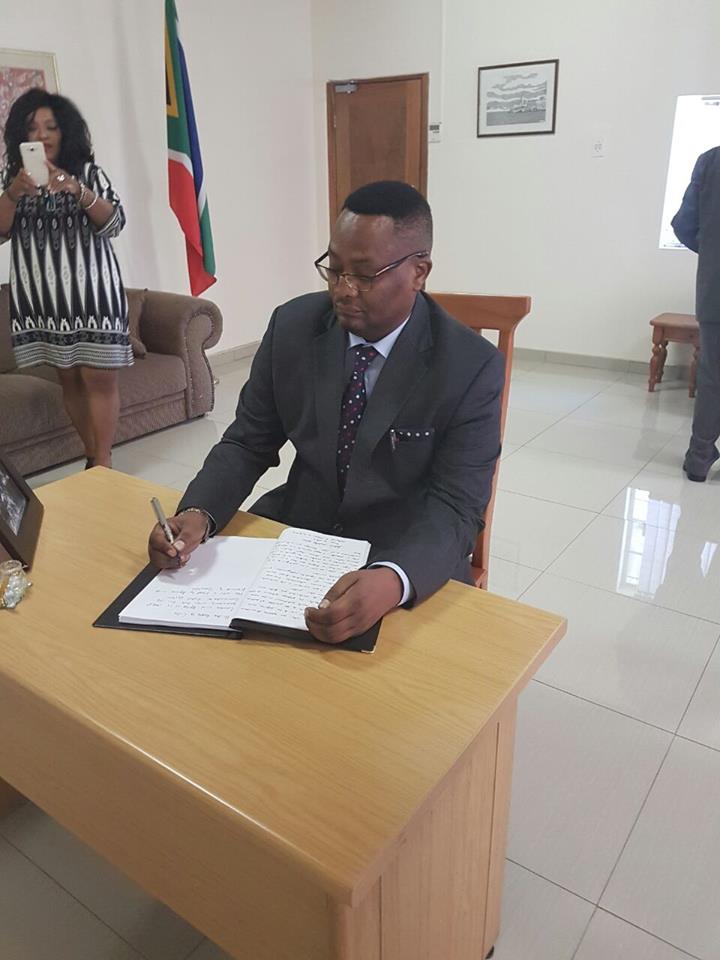
Zambia’s High Commissioner to South Africa H.E. Emmanuel Mwamba
Building on the earlier 1955 Bandung Conference and 1964 UN Conference on Trade and Development (UNCTAD), the Tricontinental represented the extension, into the Americas, of Afro-Asian solidarity begun at Bandung. As such, the Tricontinental marked a highpoint in the emergence of a non-aligned movement and the construction of a Third World anti-imperialist project. At the same time, the Tricontinental represented a break with those earlier efforts. Whereas Bandung was a relatively modest affair, in which the various political currents in the Third World came together to articulate a minimum programme, the Tricontinental was avowedly more radical, explicitly attempting to align anti-imperialism with a wider challenge to capitalism. In the words of Mehdi Ben Barka, Moroccan socialist leader and organiser of the Conference, the Tricontinental aimed to ‘blend the two great currents of world revolution: that which was born in 1917 with the Russian Revolution, and that which represents the anti-imperialist and national liberation movements of today’. Indeed, the Conference featured leftist guerrillas who were busy fighting against their own Third World governments.
In keeping with this radical orientation, the Conference condemned imperialism, colonialism and neo-colonialism, declaring its solidarity with the Vietnamese struggle against the United States. The Conference called more widely for solidarity amongst the radical currents in the Third World and debated what role they would take in relation to the United Nations. In so doing, the Conference created much controversy in the developed world, becoming the target of numerous attempts at subversion.
The Tricontinental was a large influence on the Non-Aligned Movement. In fact, its legacy includes a whole host of developments. On the legal front, General Assembly Resolutions such as the Friendly Relations Declaration and the Declaration of the New International Economic Order flowed directly from the Conference. Similarly, the ideas of military solidarity which animated the Conference bore fruit in events such as Cuba’s 1973 intervention in Angola against Portuguese colonialism.
However, despite this importance, the Tricontinental has received very little attention. Scholarship has tended to focus on the relatively modest demands of the Bandung Conference, and neglected the political cleavage represented by the Tricontinental. This has been especially true in international legal scholarship. Thus, whilst the Third World Approaches to International Law movement has paid close attention to the legal arguments of the Third World during the anti-colonial movement, the Tricontinental has not figured heavily in this account. This is representative of a wider erasure of the radical wing of the Third World movement from international legal histories. Yet this means that a key element of the Third World story has been missed. Indeed, the rich heterodox theoretical and political perspectives put forward by the Tricontinental remain lost to us.
The 50th anniversary of the First Tricontinental is an opportunity to reflect on its enduring political, legal and economic importance. We wish to consider both the historical importance of the Conference and its role as a key site for the Third World project, as well as its legacy, both intellectual and political, today.
REFLECTIONS OF MY LIFE – My Relationships With Head Masters
By Fresher Siwale Monday October 26, 2015
I recall in the late Sixties I could not be admitted into school because my hand was shorter and could not cross the my head to touch the ear robe on the other side of the head. On two occasions I was sent back home disappointed not to be enrolled into school to be with friends who were taller than me but of the same age.
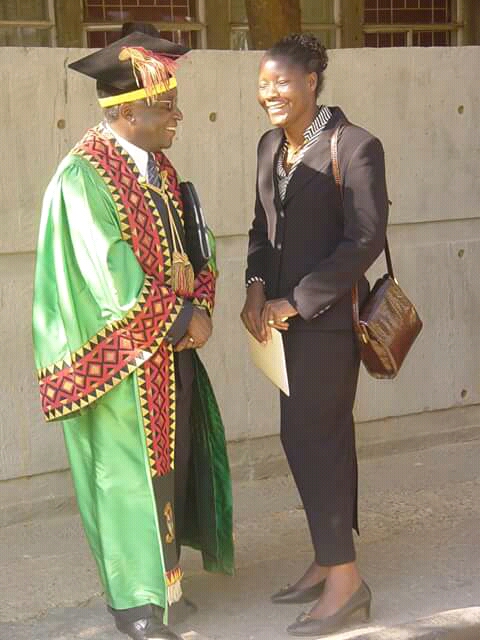
Forum for Democracy and Development President edith Zewelani Nawakwi with Dr. Jacob Mwanza UNZA – Picture by Derrick Sinjela
On this fateful day, I was playing football (chikanda) on the street with other school rejecties when the then Head Master of Mikomfwa West Primary, the late Raphael Chota who was passing by greeted us in English and out of the group I returned his greeting. He asked me whether I was in school, my response shocked him because I accused him and his fellows teachers of chasing me from their school each time I went to enroll. He held me by the hand and led me home where we found my elder sister. He ordered that I be presented before him the following day and that is how I started school in the second term of the academic year. The Head Master, later on became MP for Luanshya and Deputy Speaker of Parliament.
The man who took over from the late Raphael Chota was a Mr Bwalya whom we had nicknamed Mpempemona. Mr Bwalya as Head Master was hands on and he knew all outstanding pupils in his school and always insisted on skipping grades for brighter students. I experienced his wrath when I refused to skip Grade Six into Grade Seven on the advice of my parents who wanted me to consolidate my knowledge base. The man was so adamant to the extent of expelling me from school for what he termed at that time ” Great Insubordination”, whatever it meant that time it did not matter because I was out of school. I was readmitted the following but up to today when I look back it does not make sense. Ukukutamfya isukulu pamano Yobe!
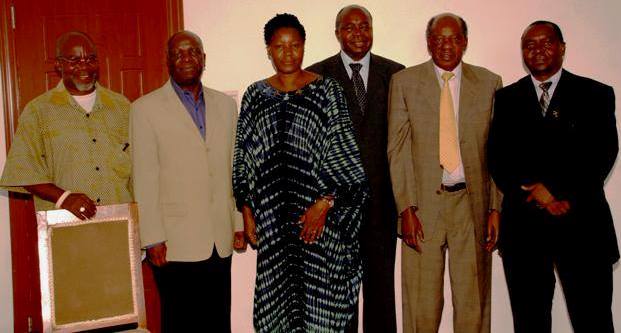
Dr. Katele Kalumba, Ng’andu Peter Magande, Ng’andu Peter Magande, Edith Nawakwi, Dr. Situmbeko Musokotwane, Alexander Bwalya Chikwanda and Rabson Chongo
In secondary school, I found a father in my Head Master Mr Musumali and once spoke in my life that regardless of my ambitions he wished for me to become a teacher and not only a teacher but with great understanding. At the time he spoke those words I had done something which which displeased him. Later on Mr Musumali became Education Attache to Russia. Many years later, I was coming from the village in Nakonde using Tazara train that was in 1987 when I got stranded connecting to Ndola at Kapiri Mposhi I just saw people pointing towards my direction and advising to go near a car parked by the roadside. Surprisingly, when I went closer only to find my Head Master Musumali smiling at me saying that no matter how long it takes he can never miss his son from a cloud and he gave a lift into Ndola. When I told him that I was a teacher he was overjoyed and said his wish had been fulfilled and that he hoped that one day I ll teach the nation. It did not make sense and since then I ve lost touch with my father, my Head Master. If anyone has information on Mr Musumali the former Head of Luanshya Boys’ Secondary School please contact me on 0977 644869.
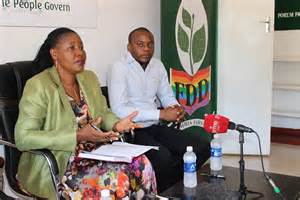
FDD President Edith Zewelani Nawakwi with her Spokesperson Antonio Mourinho Mwanza
From the time I left school, I ve had 16 Head Masters, Two I worked under when I was teaching, another 2 during my college and university years, 6 opposition leaders and 6 in government and state. I ll not dwell much on my teaching days but my experience with political Head Masters.
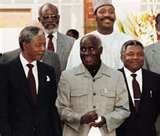
Nelson Rolihlahla Mandela with Kenneth David Buchizya Kaunda
Kenneth Kaunda, the first Republican President was born from Rev David Kaunda who a close friend and former classmate of one Donald Siwale, our Grand Father as Siwales’. Donald Siwale, on his return from Livingstonia Mission in Nyasaland setup Mwenzo Mission in Nakonde and the white missionaries came to Mwenzo, they were so impressed with work Donald had done that they asked him to extend his missionary work to Chinsali and that is how Lubwa was established. Because of the challenge to manage two mission stations, Donald went back to Livingstonia to pick his friend and former classmate David to assist him run Lubwa. David Kaunda and his family arrived in Northern Rhodesia at Mwenzo where he received orientation before his posting to Lubwa. The rest is history.
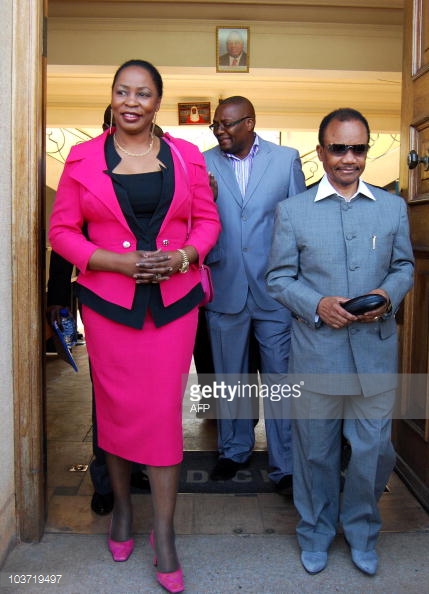
Late Dr. Frederick Jacob Titus Chiluba with wife Regina and Zambia’s High Commissioner to South Africa H.E. Emmanuel Mwamba
Frederick JT Chiluba, was a close friend to late cousin Yuweni Kapolobwe, they grew up together in Shadoville in Congo where my late aunty Alice Namwila and her husband a Mr Sika a migrated to work on the mines. At the time Frederick was known by the name Tito Bokwe and that is the name he used when he later worked Central African Road Services (CARS) and his supervisor was James Harawa Saidi who is a well renowned politician now going by another name.
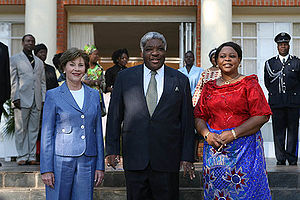
300px-Laura_Bush_with_Zambian_President_Levy_Mwanawasa_and_First_Lady_Maureen_Mwanawasa
Levy Patrick Mwanawasa was third Head Master in the state. I met the late when my late friend Geoffrey Musukuma joined Mwanawasa and Co.in Ndola after he left the Attorney Generals Chambers where he served with Hon Toddy Chilembo in the late 80s and also from his uncles side in Mufulira a Mr Kachasu.
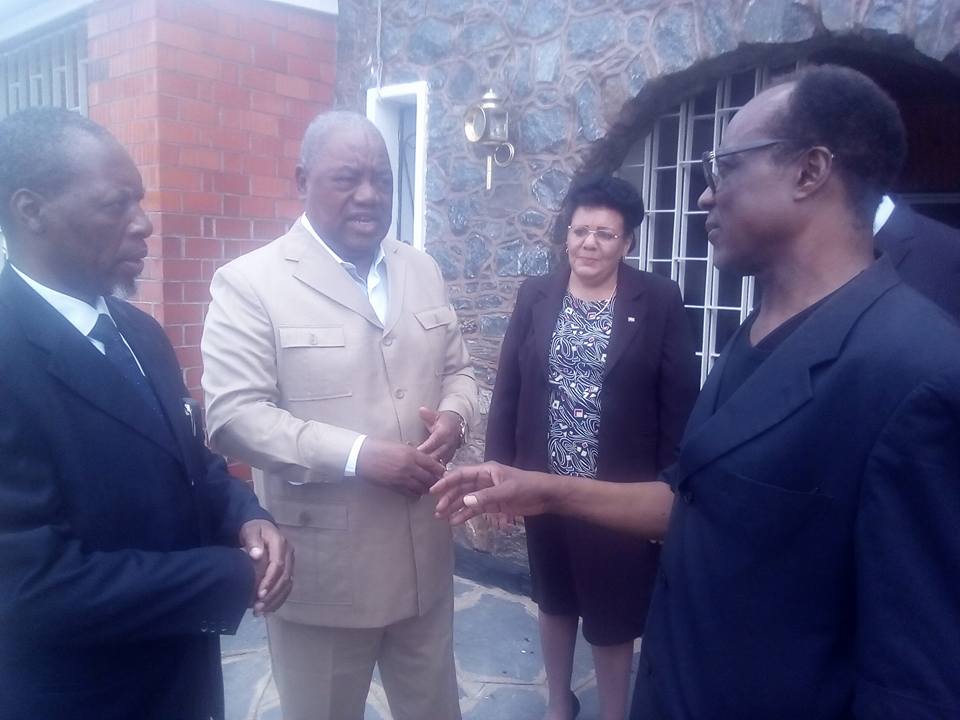
Former Fourth Republican President Rupiah Bwezani Banda, Cuban Ambassador to Zambian, Malawi and COMESA, Ambassador Caridad Perez Gonzalez, Zambia-Cuba Friendship Association Acting President, Tentani Mwanzah and and Adminstrative Assistant Chibeza Mfune after signing a Book of Condolences in honour of departed Cuban Revolutionart Fidel Castro Ruz at the Cuban Embassy in Lusaka’s Kalundu residential area, last year picture by Derrick Sinjela
Rupiah Bwezani Banda – I met the famous RB after the UNIP Congress of 2000 and we would spend discussing politics at his Longolongo Road office and at the time he was disgusted with the chant “Kaunda ng a talipo bones aba nibangwele” and he would always ask me “Ningankale ngwele was Kaunda one?”

Michael Chilufya Sata with Secretary General Wynter Kabimba and Spokesperson Given Lubinda
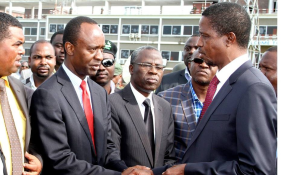
Mulenga Sata with President Edgar Lungu
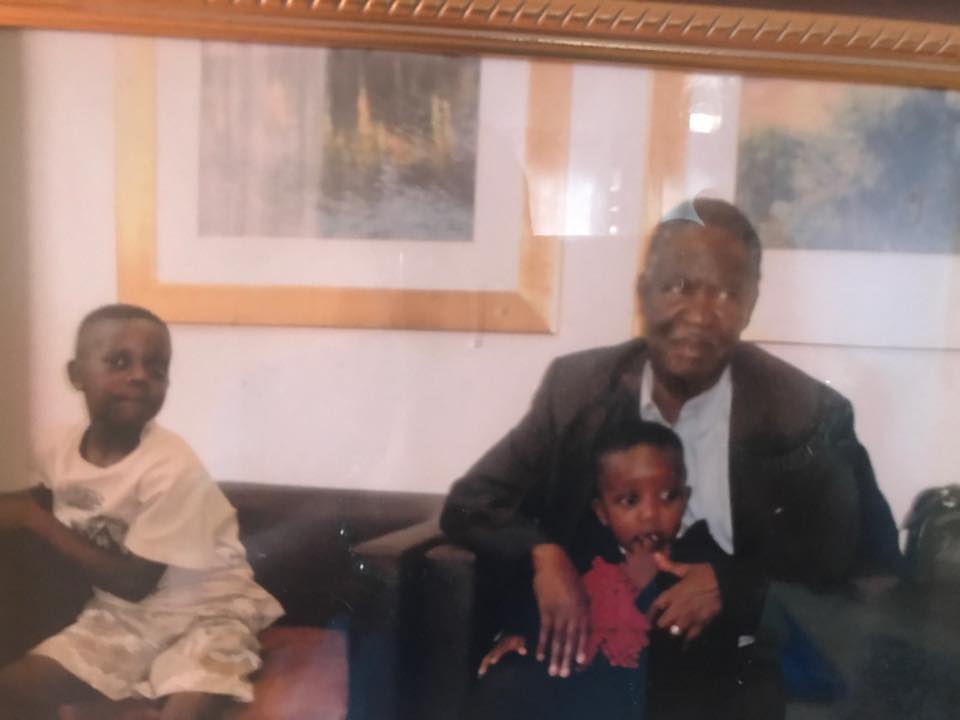
Sata with Kalaba’s children
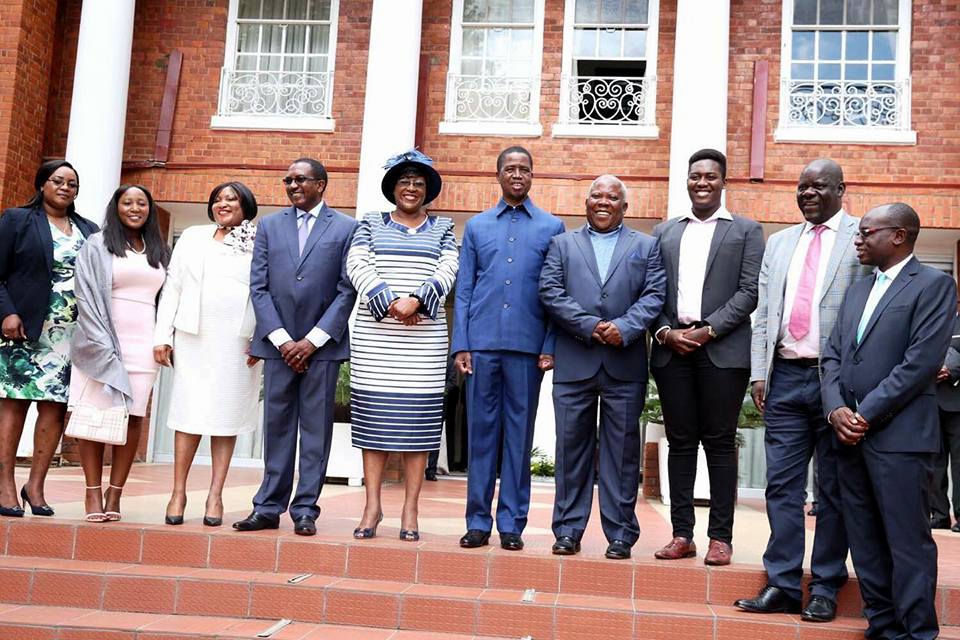
President Lungu with Dr Christine Mwelwa Kaseba-Sata as Zambia’s new Ambassador to France
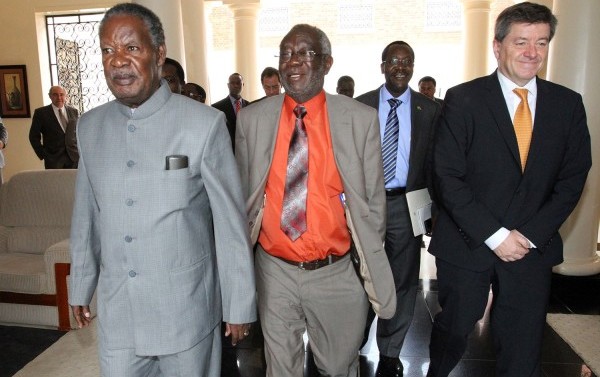
President Michael Chilufya Sata with Guy Ryder Director General of International Labour Organization and Labour Minister Fackson Shamenda
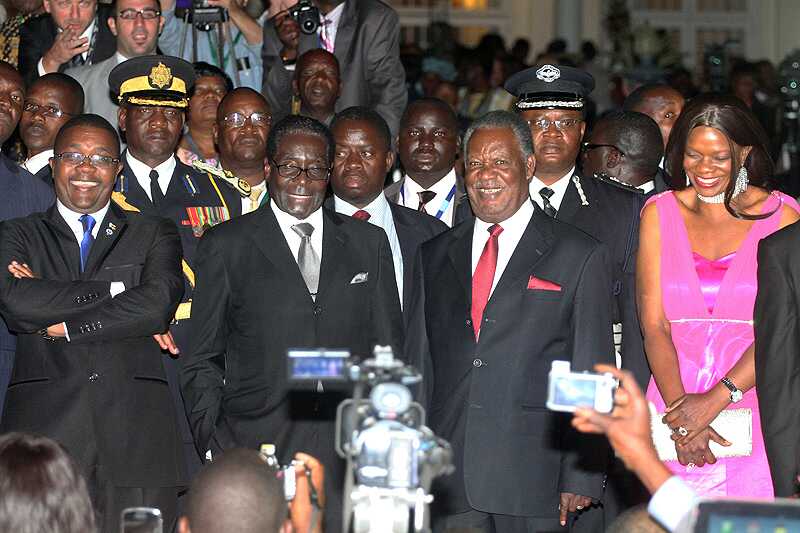
Zimbabwe Tourism Minister Walter Muzembi ,Pres.R.G Mugabe,Pres.M.Sata
Michael C Sata, was a man I had rare privilege to be his spokesperson for the 2006 election and we had our fair share of differences in opinion and once told to my face “Back Ngoshe babili tabekala chulu chimo, back Siwale mwacheñjèlesha go and form your own party”. That was Michael, MHSRIP.
Edgar Lungu still remains a mystery though awe worked together in PF no one knows his vision and background but I am certain Margaret Dudu Mhango Manakatwe could hold the key to knowing who Edgar Chagwa Lungu is.


